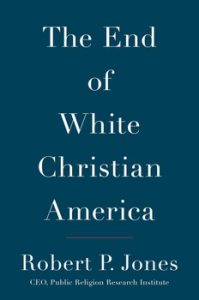 Robert Jones interprets many of today’s most contentious political and cultural battles as the product of shifts in America’s demographic make-up. He convincingly shows that ongoing demographic shifts in America’s ethnic mix are accompanied by unprecedented changes in religious affiliation. White Christian (by which he means Protestant) Americans dominated American politics and social life for most of our nation’s history. Jones dates the shift away from this dominance to the election of John F. Kennedy – a Catholic– in 1960, with the change accelerating through the 1960s and 1970s. In subsequent decades, the number of religiously unaffiliated Americans surged, along with increases in the numbers of Catholic, Jewish, Muslim and others. The last year that Protestants represented a majority was 2008. Jones uses survey data to identify a generational shift within Protestant mainline and evangelical movements, finding younger believers to be far more accepting of gay and interracial marriage.
Robert Jones interprets many of today’s most contentious political and cultural battles as the product of shifts in America’s demographic make-up. He convincingly shows that ongoing demographic shifts in America’s ethnic mix are accompanied by unprecedented changes in religious affiliation. White Christian (by which he means Protestant) Americans dominated American politics and social life for most of our nation’s history. Jones dates the shift away from this dominance to the election of John F. Kennedy – a Catholic– in 1960, with the change accelerating through the 1960s and 1970s. In subsequent decades, the number of religiously unaffiliated Americans surged, along with increases in the numbers of Catholic, Jewish, Muslim and others. The last year that Protestants represented a majority was 2008. Jones uses survey data to identify a generational shift within Protestant mainline and evangelical movements, finding younger believers to be far more accepting of gay and interracial marriage.
Jones argues that it is this demographic shift that has driven the furor over several key issues in recent years, including same-sex marriage, abortion, and a number of initiatives to infuse politics with “Biblical values.” Jones cites polling data indicating evangelical white Protestants are the least likely group to have black friends to explain their alienation from movements such as Black Lives Matter. He likens the passion driving the religious white conservative reaction to the “anger and denial” stage of grief, predicting believers will eventually refocus their energies on strengthening their own community of believers.

(via Jeff Kubina)
Jones’s interpretation of today’s culture wars is shaped by his own liberal outlook, but his account should also be interesting to conservative readers. Regardless of one’s political views, the demographic changes he outlines are real and are changing America’s politics and culture. The data Jones provides derives from solid sources. Most of the explanations for the rise of the “angry voter” behind the Trump campaign have focused on economic issues. While Jones does not address the 2016 presidential campaigns, his work provides a useful background on how demographics also factor into the rise of Trump’s popularity. The results of the campaign should also prove an interesting test of Jones’s argument that “White Christian America” has lost the political clout to dominate national politics.
Robert P. Jones, The End of White Christian America (New York: Simon & Schuster, 2016)
Chris Babits offers Another Perspective on the Texas Textbook Controversy.
Prof. Jacqueline Jones explains The Myth of Race in America.
Prof. Howard Miller looks at the history behind the question “What Would Jesus Do?”
![]()



